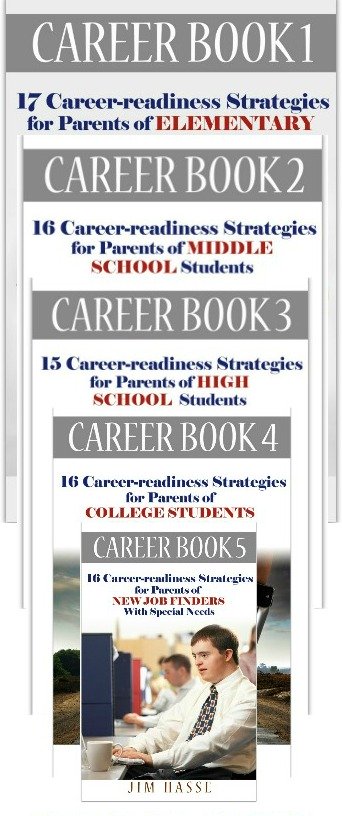Problem Solving Activities: Cerebral Palsy Career Builder at Elementary Level
By Jim Hasse, ABC, GCDF, Disability Employment Expert
_________________________________________________________
Here are some problem solving activities designed to help your elementary student with cerebral palsy (CP) acquire skills in communication and teamwork, two key attributes which will continue to be essential in tomorrow’s workplace.
Communication includes reading, writing, listening, and speaking. Keep lots of quality reading material around the house.
Make visits to the library part of your family routine. Point out that pleasurable reading comes from good writing.
Consider these four additional ideas for helping your elementary school youngster become a better communicator:
- Read to your
youngster, and have your youngster read to you. Let your youngster see you read at least 20 minutes a day.
- Encourage good
listening. Discuss the content of what you or your youngster have read. Tell stories, and have your youngster re-tell them in detail.
- Play games that
involve writing, speaking, listening and imagination. Charades requires non-verbal
skills.
- Encourage writing. Expect that your youngster will write letters and thank you notes to relatives and friends. Make sure your youngster has writing materials, such as journals and diaries, available.

Problem solving activities for improving teamwork
Teams are not only important on the athletic field. All aspects of life require people to work effectively as members of teams. Think of your family as a team, and use some of these ideas:
- Build your
family team. Involve your youngster in family discussions or decisions, as appropriate
for his or her age and maturity level.
- Work together.
Give your youngster important jobs to do within the family or work on chores together.
- Practice
conflict resolution. Teach your youngster to get along with others by modeling good teamwork
and conflict resolution.
- Learn together. Emphasize the learning that takes place in groups, whether on school projects or team activities like sports, music, theater, or volunteering.
Activities for laying an employment foundation
Employment requires understanding and using tools and technology, working in organizations and systems, and following procedures. You can help your youngster begin building these skills at home by:
- Doing projects
that require many steps, use of tools, and following procedures, such as:
- Cooking together (your youngster could read recipes and measure ingredients).
- Doing laundry (your youngster could sort items of clothing according to color, read washing instructions, measure detergent and time wash cycles).
- Going grocery shopping (have your youngster write shopping lists, compare food prices, make change, and identify and classify food items).
- Fixing the family photo album (have your youngster sort pictures, write labels for each photo or write a story about some of the photos).
- Organizing the house (have your youngster sort items in a "junk drawer," label them and arrange them alphabetically).
- Talking about
products and services you use. Introduce your youngster to all aspects of work, including
technology, business, artistic, social and customer service perspectives.
- Discussing new technologies and how they change our lives. Discuss ways to improve products, processes and services with your youngster. Encourage him or her to brainstorm solutions to technical and human problems.
Activities for teaching self-management skills
Good personal habits are the foundation for lifelong achievement. You can help your youngster develop the work and study habits that teachers and employers value.
Those habits may be called by many names: Work ethic, personal management, and self-management skills are a few. Regardless of its name, a good work ethic is the skill most valued by employers. Hiring managers want honest, dependable, and productive workers.
You are your youngster’s first teacher when it comes to good work habits. You demonstrate daily the importance of taking pride in what you do and in doing a good job. To model a good work ethic at home, you need to set standards for yourself and your youngster.
As your elementary student matures into adolescence, he or she can earn greater independence by meeting obligations, being trustworthy, and respecting themselves and others.
Teach:
- Responsibility. Follow-through on your own obligations and promises, and expect your youngster to do the same. When you have to work extra on a project, use that as a teaching moment. Sometimes personal sacrifices need to be made to do a good job.
- Effort.
Demonstrate how to schedule and perform household tasks. Maintain high standards
for chores around the house. Your youngster doesn't have to be a genius to get
ahead. Success often goes to the people who know how to get the job done and
are willing to do what it takes.
- Persistence.
Give praise for jobs that are well done, and discuss jobs done incompletely. Expect
your youngster to complete tasks, sticking to them until they are done to
the agreed-upon standard.
- Focus. Expect
all homework and school assignments to be done completely, neatly, and on time.
Your youngster may have other activities to do, but assignments need a full focus.
- Punctuality. Take your youngster to school and other activities on time. Teach the importance of being on time, by being punctual for your own obligations as well.
Return
from Problem Solving Activities to Job Titles
Go
to Cerebral Palsy Career Builders
This is Creative Commons content. You can freely and legally use, share and repurpose it for non-commercial purposes only, provided you attach this sentence and the following attribution to it (including the two links):
Originally written and illustrated by Jim Hasse, ABC, GCDF, owner of Hasse Communication Counseling, LLC, who, as a person with cerebral palsy, served for 10 years as a vice president in a Fortune 500 company during his 29-year career in corporate communication. He’s an Accredited Business Communicator, certified as a Global Career Development Facilitator and author of 14 Amazon books about disability awareness and disability employment issues.





